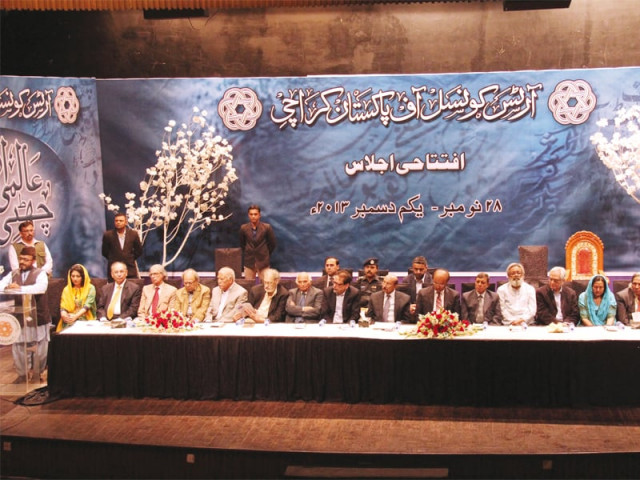6th International Urdu Conference: Arts Council president was as excited as on his wedding day
Karachi Arts Council will be hosting the big names of Urdu literature in four-day moot.

Urdu writers and poets, from both Pakistan and India, have flown in to celebrate the Urdu language at a four-day conference that started on Thursday. PHOTO: AYESHA MIR/EXPRESS
“Even though my wife is sitting here in front of me, I feel like I am getting married for the sixth time today,” joked Muhammad Ahmed Shah. In his six years as the president of the council, Shah was no doubt happy to host the conference for the sixth time.
Like every year, the conference has attracted writers and poets from across the border to attend the four-day event in which the literati will discuss the Urdu language, its importance and evolution.
The auditorium of the Karachi Arts Council was jam-picked with noted writers, critics, poets and Urdu lovers at the inaugural session of the conference where the presenter of the ceremony Dr Huma Mir was repeatedly requesting the people make room for those who could not get seats.
Addressing the conference, Sindh Chief Minister Qaim Ali Shah — who was the chief guest — said writers and scholars fight a war against ignorance and the war of right and wrong in a country, which makes them more important. “Literati protect the ideological borders of its country.” He also shed light on the need to connect the literati and the politicians.
Noted Urdu literary critic from India, Shamim Hanfi, stole the show with his key note address. He appealed to the government officials to look beyond the small things that hinder the path of people from both countries who are unable to take back anything except “words” and “happy memories”. A copy of a university thesis costs more than a thousand raupees to reach India, he pointed out, hoping the two governments would reduce this cost for the benefit of students and libraries.
“A society that doesn’t pave way for education and literature cannot be called civilised,” Hanfi said, adding that it is books that allow people like him to learn about Pakistan without even having to come here. “I wish our politicians can understand this.”
Hanfi regretted that literature is not getting much value these days as it used to get in the past. Nevertheless, he praised the conference for giving people of both countries a chance to meet those people who they have read but never met.
Urdu fiction writer Intizar Hussain recalled that time in literature when scholars would write more than speak. But, now the trend has changed and writers focus more on talks than writings, he added. “There was a time when we had small literary gatherings where we would read out our works without paying any attention if newspapers would publish the gathering or not,” he said. “Now this has disappeared and conferences have replaced them. We have left our readers behind and we only keep our minds on the listeners and viewers on electronic media.”
Later, Hussain praised the conference for opening a window towards India that had been closed. Urdu literature and language is incomplete without the Urdu speakers of India, he said.
The chief minister requested the writers and scholars to help the government and the country struggle to restore peace. “You writers are the people who can reduce the disappointment that has spread among people if you write the truth about those who are behind terrorism and show their real faces to the people,” he said, before announcing a grant of Rs10 million for the conference.
Published in The Express Tribune, November 29th, 2013.



















COMMENTS
Comments are moderated and generally will be posted if they are on-topic and not abusive.
For more information, please see our Comments FAQ